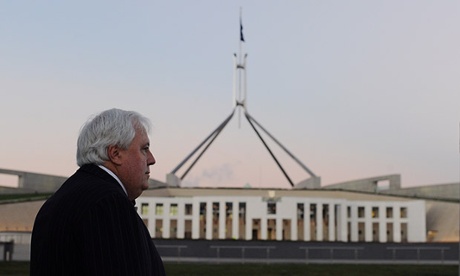Palmer United Party Deal Revives Uncertainty For Asylum Seekers
A
new deal struck by the Palmer United Party and Scott Morrison will
prevent asylum seekers currently held in detention centres in Australia
from ever being granted permanent protection visas, even after they are
found to be genuine refugees.
On Thursday morning PUP leader Clive Palmer announced his party had
reached an agreement with the Coalition to back the reintroduction of
Temporary Protection Visas (TPVs) which will allow refugees to settle in
Australia for just three years before they have their claims to asylum
reassessed.
Those placed on TPVs will have work rights, and will be offered access to social security.
As part of the deal, Palmer announced a new class of visa called the
Safe Haven Enterprise Visa, which will enable regional businesses and
communities to make a request to have TPV holders come and fill jobs in
their area.
The changes have been touted by Palmer and Minister Scott Morrison as
a way to deal with the so-called ‘legacy caseload’ of around 30,000
asylum seekers who are currently in Australia and waiting to have their
claims processed.
Palmer said those being held on Christmas Island will be eligible for
the new visas but Morrison confirmed asylum seekers already moved to
Manus and Nauru would not. Any new arrivals will be sent to offshore
processing and will not be eligible for settlement in Australia.
Morrison said people currently being held on Christmas Island would
not be moved to Nauru while the legislation is examined and debated by
the Parliament.
Refugee advocates have accused Morrison of deliberately going slow on processing these people, a claim that has been backed by evidence presented at the AHRC’s children in immigration detention inquiry.
In response, Morrison has attacked the Greens and Labor for refusing
to allow the previous attempts to reintroduce TPVs through the
Parliament.
“The introduction of TPVs is a key element of the Government‘s border
protection strategy to combat people smuggling and to discourage people
from making dangerous voyages to Australia,” the Bill’s explanatory
memorandum states.
TPVs have long been opposed by asylum seeker advocacy groups, who
claim they place legitimate refugees in limbo and reinforce the
psychological harm inflicted by indefinite detention.
The visa changes are part of a broader package introduced to the
parliament today, which includes amendments altering the way children
born in detention are classified and the relationship between
Australia’s international obligations and domestic law.
The Human Rights Law Centre has been quick to raise concerns about
the Bill, which looks likely to pass the Senate once it gets out of a
committee review.
HRLC’s Daniel Webbs said Morrison was trying to escape Australia’s obligations under international law.
“The Minister has trumpeted the TPV issue but that’s just the tip of
the iceberg. Lurking beneath the surface, today’s Bill contains a suite
of appalling reforms which impact on the way asylum seekers will be
treated both here and at sea,” Webb said.
“If these changes go ahead, some babies born in this country will be
subject to mandatory detention and mandatory removal to Nauru as soon as
possible.”
new deal struck by the Palmer United Party and Scott Morrison will
prevent asylum seekers currently held in detention centres in Australia
from ever being granted permanent protection visas, even after they are
found to be genuine refugees.
On Thursday morning PUP leader Clive Palmer announced his party had
reached an agreement with the Coalition to back the reintroduction of
Temporary Protection Visas (TPVs) which will allow refugees to settle in
Australia for just three years before they have their claims to asylum
reassessed.
Those placed on TPVs will have work rights, and will be offered access to social security.
As part of the deal, Palmer announced a new class of visa called the
Safe Haven Enterprise Visa, which will enable regional businesses and
communities to make a request to have TPV holders come and fill jobs in
their area.
The changes have been touted by Palmer and Minister Scott Morrison as
a way to deal with the so-called ‘legacy caseload’ of around 30,000
asylum seekers who are currently in Australia and waiting to have their
claims processed.
Palmer said those being held on Christmas Island will be eligible for
the new visas but Morrison confirmed asylum seekers already moved to
Manus and Nauru would not. Any new arrivals will be sent to offshore
processing and will not be eligible for settlement in Australia.
Morrison said people currently being held on Christmas Island would
not be moved to Nauru while the legislation is examined and debated by
the Parliament.
Refugee advocates have accused Morrison of deliberately going slow on processing these people, a claim that has been backed by evidence presented at the AHRC’s children in immigration detention inquiry.
In response, Morrison has attacked the Greens and Labor for refusing
to allow the previous attempts to reintroduce TPVs through the
Parliament.
“The introduction of TPVs is a key element of the Government‘s border
protection strategy to combat people smuggling and to discourage people
from making dangerous voyages to Australia,” the Bill’s explanatory
memorandum states.
TPVs have long been opposed by asylum seeker advocacy groups, who
claim they place legitimate refugees in limbo and reinforce the
psychological harm inflicted by indefinite detention.
The visa changes are part of a broader package introduced to the
parliament today, which includes amendments altering the way children
born in detention are classified and the relationship between
Australia’s international obligations and domestic law.
The Human Rights Law Centre has been quick to raise concerns about
the Bill, which looks likely to pass the Senate once it gets out of a
committee review.
HRLC’s Daniel Webbs said Morrison was trying to escape Australia’s obligations under international law.
“The Minister has trumpeted the TPV issue but that’s just the tip of
the iceberg. Lurking beneath the surface, today’s Bill contains a suite
of appalling reforms which impact on the way asylum seekers will be
treated both here and at sea,” Webb said.
“If these changes go ahead, some babies born in this country will be
subject to mandatory detention and mandatory removal to Nauru as soon as
possible.”




